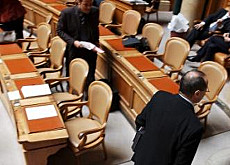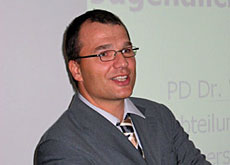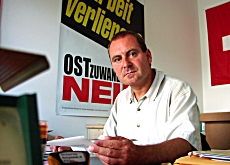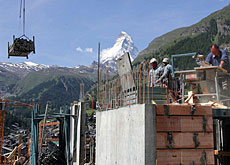Far-right crushed by success of People’s Party

The Swiss Democrats, Switzerland's first far-right party in the post war period, has vowed to fight on despite losing its only seat in the 2007 parliamentary elections.
In its heyday, the far-right group was a political force to be reckoned with, making the curbing of immigration socially acceptable.
The Swiss Democrats saw their share of the vote drop below one per cent and lost their only seat in the 200-member House of Representatives in last week’s parliamentary ballot.
“We disappeared from the federal parliament, because we were steamrolled by the powerful People’s Party,” said party president Bernhard Hess, who failed to defend his seat.
He even mooted the idea of dissolving the party altogether and transforming it into a loose “patriotic movement”.
However, his suggestion fell on deaf ears at a meeting of the party leadership at the weekend. The Swiss Democrats intend to carry on their political fight and win back a seat in parliament.
Yet renewed bickering among the local groupings is not a promising sign for the future.
Hans Hirter, political scientist at Bern University, says the Swiss Democrats can only survive on the sidelines, forced to watch the Swiss People’s Party enjoy its success due to its own restrictive immigration policies.
“The rise of the People’s Party to the top over the past 15 years was bad news as it pulled the carpet under the feet of the Swiss Democrats and any other far-right group.”
Success
Hirter says the Swiss Democrats, or their predecessors, made their mark in the country’s history as a group which appealed to the lower-class segment of voters with its strictly nationalist and populist agenda from the 1960s onwards.
“They ultimately made restrictions on immigration socially acceptable and managed to keep up the pressure, not necessarily through their presence in parliament, but through referendums,” says Hirter.
The group won its first seat in parliament in 1967 and a few years later reached a high of 11 seats.
A first initiative aimed at curbing immigration failed at the ballot box in 1970, as did similar attempts later on.
Over the next two decades the party went through several ups and downs and finally took the name of Swiss Democrats in 1990.
But the party’s nationalist policy – opposing closer relations with the European Union and the United Nations as well as its hard-line stance on liberalising drugs – was increasingly usurped by the People’s Party.
National Day
Hess recalled two ballot box successes as party highlights. An initiative to make National Day, August 1, a public holiday across the country won overwhelming approval by voters in 1993.
Two years later the Swiss Democrats launched a referendum and successfully blocked a decision by parliament to ease restrictions on the sale of property to foreigners.
In its best days the party could count on substantial donations from a well-known retailer in Switzerland.
Today it counts around 6,000 members, mostly in the German-speaking part of the country.
Neither Austria’s Freedom Party nor the National Front of Jean-Marie Le Pen in France are really comparable with the Swiss Democrats.
Political scientist Hirter says the Swiss Democrats are too small and too limited in their scope, while party member Hess prefers to mention similarities with Italy’s Northern League – a party with a strong regional focus – and Britain’s UK Independence Party.
But Hess says there are no formal links across the Swiss border.
swissinfo, Urs Geiser
The Swiss Democrats were the last hardcore far-right party in parliament until they lost their only remaining seat in the 2007 seat.
The party is still represented in several cantonal parliaments.
They party says it will press on with its opposition against bilateral treaties between Switzerland and the EU and plans to ease restrictions on property sales to foreigners.
The Lega dei Ticinesi still have one seat in the federal parliament and are closely linked to the rightwing Swiss People’s Party.
On a regional level, they also hold a set in the Ticino government.
The Freedom Party was represented in parliament between 1987-1999.
The Federal Democratic Union is a fundamentalist Christian party and lost one of its two seats in the 2007 parliamentary elections.

In compliance with the JTI standards
More: SWI swissinfo.ch certified by the Journalism Trust Initiative




You can find an overview of ongoing debates with our journalists here. Please join us!
If you want to start a conversation about a topic raised in this article or want to report factual errors, email us at english@swissinfo.ch.